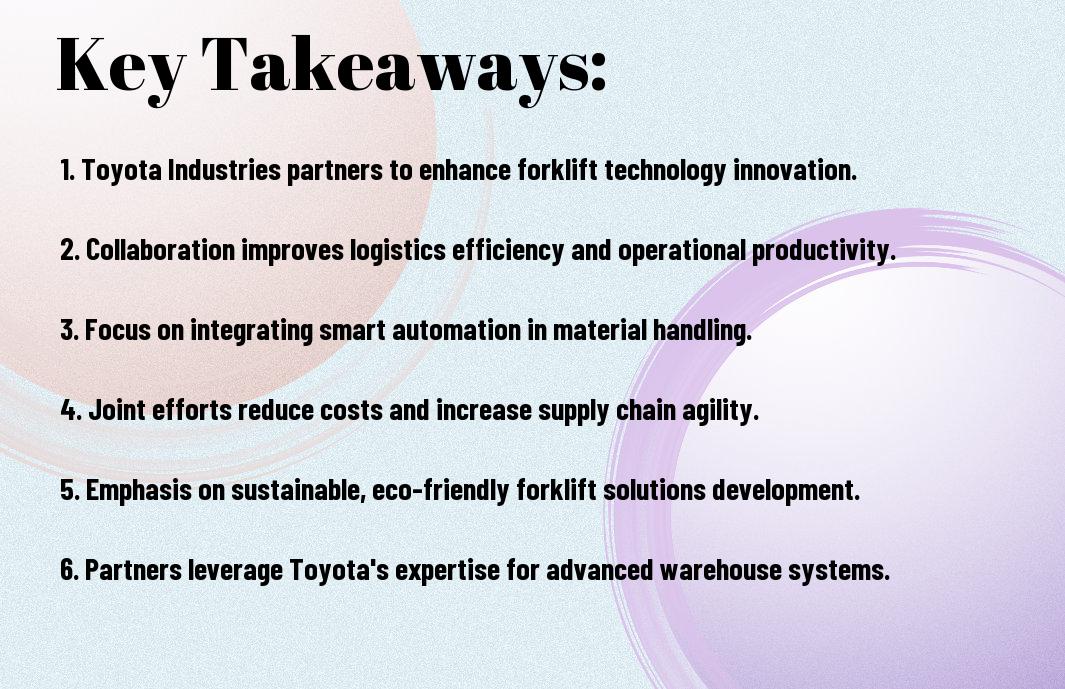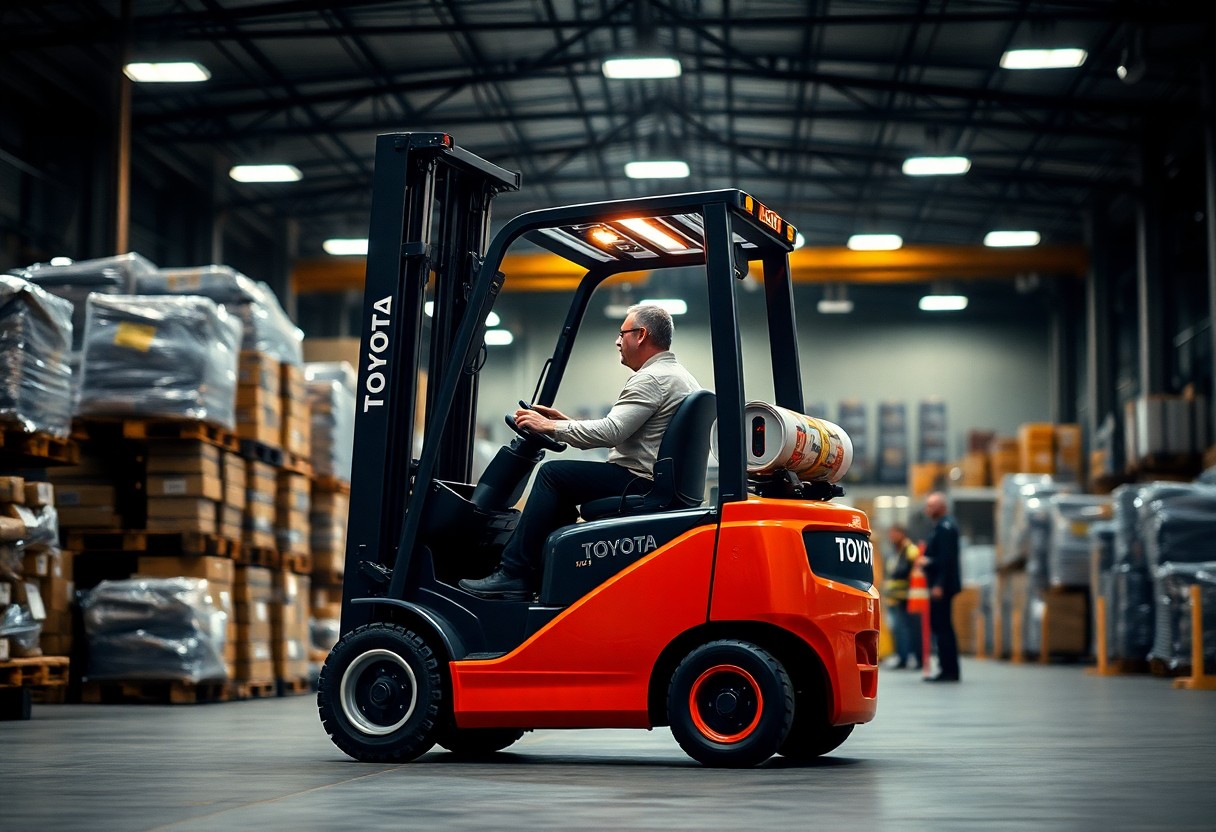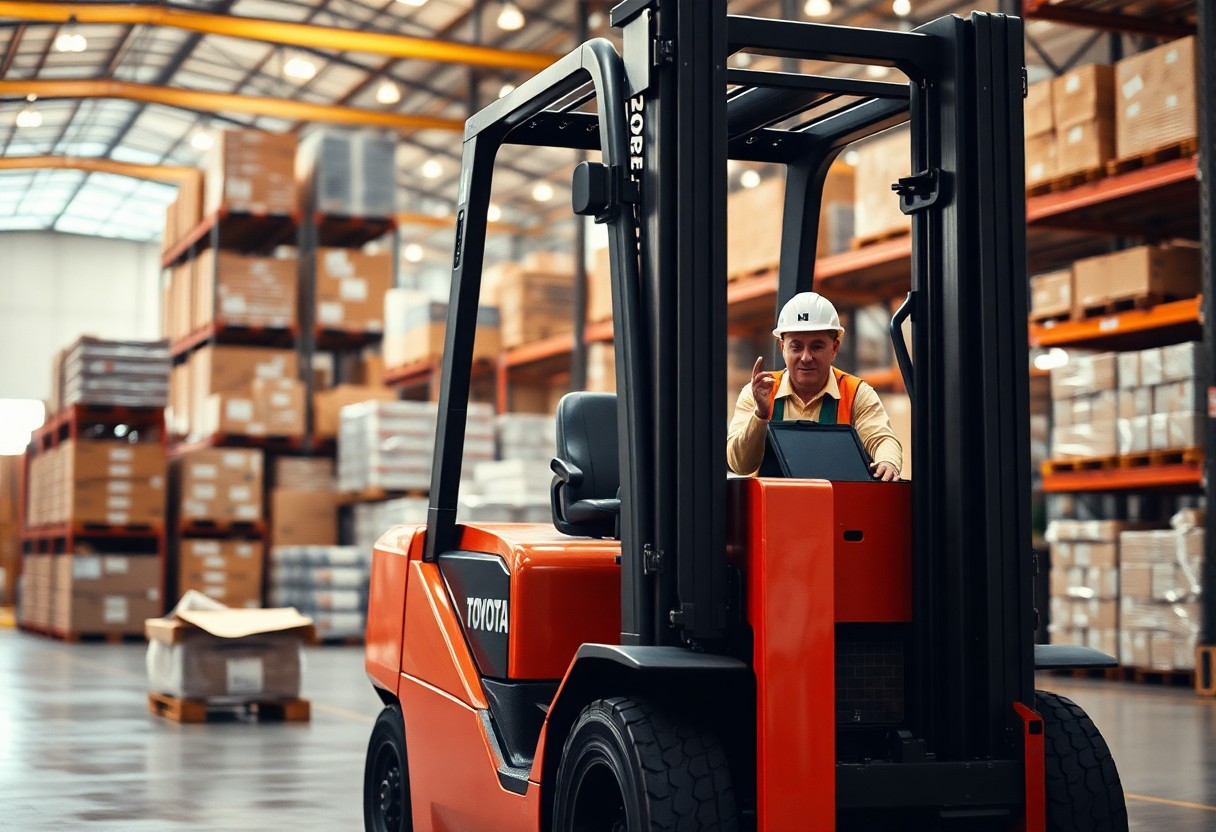You might be surprised to learn how Toyota Industries Corporation has become a leader in providing innovative forklift and logistics solutions. By working together with various industries, I ensure that you gain insights into how their advanced technologies and collaborative approaches enhance efficiency and safety in material handling. The emphasis on sustainability and reliability not only boosts productivity but also sets a new standard for operational excellence. Join me as we explore how Toyota Industries Corporation is transforming the logistics landscape for businesses around the world.
Key Takeaways:
- Toyota Industries Corporation focuses on innovative collaboration to enhance forklift and logistics solutions, driving efficiency in supply chain operations.
- The partnership approach enables the company to leverage advanced technologies and improve product offerings tailored to customer needs.
- By integrating sustainability initiatives, Toyota Industries aims to contribute to a greener supply chain while maintaining competitive advantages in the market.

Overview of Toyota Industries Corporation
The Toyota Industries Corporation (TICO) is a prominent player in the global market, specializing in a diverse range of industries, including automotive manufacturing, logistics solutions, and material handling equipment. Established in 1926, TICO has made significant advancements in technology and service delivery, making it a household name in various sectors. With its unwavering commitment to quality and innovation, TICO continues to shape the industry landscape while expanding its international presence.
Company History
Before its remarkable evolution, the company originated as a division of the Toyota Group, focusing primarily on the production of textile machinery. In the following decades, I have witnessed TICO diversify its operations to incorporate forklift manufacturing and automotive components. By the 1990s, Toyota Industries Corporation expanded its reach globally, acquiring several companies in strategic markets, thereby solidifying its position as a leader in logistics and material handling.
Core Business Areas
After establishing a strong foundation, TICO’s core business areas now primarily encompass automotive components, forklift manufacturing, and logistics solutions. The company excels in designing and producing electric and internal combustion forklifts, which are vital for the efficient movement and storage of materials in various industries. Additionally, it provides innovative logistics solutions, aiming to streamline supply chains and enhance operational efficiency for businesses.
Even more importantly, these core business areas are pivotal in ensuring TICO maintains its competitive edge in the market. By continually investing in research and development, the company has adapted its products to meet the evolving demands of customers. Furthermore, TICO places a strong emphasis on sustainability, with initiatives aimed at reducing environmental impacts through the development of energy-efficient forklifts and solutions that improve productivity while minimizing waste. As a result, businesses can leverage TICO’s technology to enhance their operations and stay ahead in an increasingly competitive market.
Forklift Manufacturing Innovations
One of the most fascinating aspects of Toyota Industries Corporation’s approach to forklift manufacturing is the brand’s commitment to advancing technology. By integrating cutting-edge technology into their forklifts, I can assure you that they are not just enhancing functionality, but also improving safety and efficiency. The use of advanced sensors, automated systems, and smart connectivity allows for real-time monitoring and optimization of forklift operations, enabling you to make informed decisions and streamline your logistics processes.
Technology Advancements
At the forefront of these innovations is the introduction of autonomous forklifts, which represent a significant leap in logistics automation. I find it quite remarkable how these vehicles can navigate complex warehouse environments without human intervention, reducing the risk of accidents and improving productivity. This is not just about replacing human labor; it’s about enhancing the overall efficiency of your operations by allowing your workforce to engage in more value-added tasks while the forklifts handle the heavy lifting.
Sustainability Practices
Technology plays a major role in how I view sustainability in forklift manufacturing. Toyota Industries Corporation is dedicated to reducing its environmental impact and enhancing energy efficiency through innovative design and materials. By employing electric-powered forklifts and utilizing sustainable resources in production, I can confidently say that the company is paving the way for greener logistics solutions.
It is paramount for you to consider that Toyota Industries Corporation has implemented recycling programs and reduced waste in their manufacturing processes. The commitment to sustainable forestry practices ensures that the materials used in construction are sourced responsibly, thus preserving natural ecosystems. Through these initiatives, the company not only minimizes its carbon footprint but also sets a benchmark for others in the industry, making it a pioneer in sustainable forklift manufacturing.
Logistics Solutions Offered
Keep in mind that the logistics solutions provided by Toyota Industries Corporation are designed to enhance operational efficiency across various industries. These offerings encompass a broad spectrum of services aimed at optimizing supply chains and ensuring that businesses can meet their demands effectively. With a deep understanding of industry needs, I can confidently say that Toyota Industries excels at delivering tailored solutions that streamline workflows and reduce costs, ultimately boosting profitability for their clients.
Supply Chain Management
Chain management involves a detailed approach to integrating various components of the supply chain. I’ve observed that Toyota Industries Corporation leverages advanced data analytics and strategic planning to enhance inventory management, distribution, and supplier relationships. This comprehensive strategy allows businesses to increase responsiveness to market demands while minimizing excess inventory and operational inefficiencies. By focusing on these areas, you can significantly improve your supply chain performance, leading to better customer satisfaction and loyalty.
Automated Systems
Any logistics operation can benefit greatly from the integration of automated systems. These technologies allow for increased precision and speed in warehouse operations, fulfilling orders with minimal human intervention. I find that the adoption of robotics and artificial intelligence in warehouse settings not only enhances productivity but also decreases the likelihood of human error. As you begin to implement these solutions, you will notice a significant improvement in workforce efficiency, setting you on a path toward greater operational resilience.
To truly understand the impact of automated systems, consider the various types that Toyota Industries offers. These include automated guided vehicles (AGVs), inventory management systems, and warehouse management software capable of real-time tracking and analytics. I encourage businesses to embrace these innovations, as they pave the way for a more streamlined operation. With automation, you can not only reduce labor costs but also improve safety, as machines take over more dangerous tasks, creating a safer environment for your workforce.

Collaborative Partnerships
Many businesses in the material handling industry realize the importance of forming strong collaborative partnerships. I have seen how Toyota Industries Corporation leverages its global network to create alliances with industry leaders, suppliers, and logistics companies. This approach enables the company to enhance its forklift technology and logistics solutions, ensuring they remain adaptive to market changes and customer needs. By fostering these relationships, Toyota Industries Amplifies the effectiveness of its resources and drives innovation that further benefits customers.
Industry Collaborations
With an emphasis on innovation, I have observed that Toyota Industries Corporation actively engages in collaborations across various industries. These partnerships allow the company to integrate complementary technologies and services that enhance both forklift performance and logistics efficiency. For instance, by teaming up with tech companies, Toyota can incorporate advanced automation and data analytics into their products, leading to more intelligent and efficient supply chain solutions. Such interactions not only strengthen their market position, but also create new opportunities for product development.
Customer Engagement Strategies
Above all, I find Toyota Industries Corporation prioritizes customer engagement as a key component of their collaborative partnerships. By actively soliciting feedback from customers, they adapt their offerings to meet evolving demands, ensuring that you, as the customer, feel valued and heard. This direct interaction facilitates a deeper understanding of your unique operational needs, enabling Toyota to tailor their solutions to fit your specific requirements more effectively.
Also, engaging with customers extends beyond simple feedback mechanisms; it includes providing ongoing support, training, and resources that empower you to maximize the value of your investments. By nurturing these relationships, Toyota Industries builds trust, which ultimately leads to long-term partnerships. They create user-friendly platforms where insights and experiences can be shared, making it easier for customers to navigate advancements in forklift and logistics technology. This commitment to engagement helps deliver lasting customer satisfaction and encourages loyalty in a competitive market.
Case Studies of Success
Once again, Toyota Industries Corporation has demonstrated its exceptional ability to lead in the forklift and logistics sector through an array of successful projects. The following case studies highlight how they have provided innovative solutions that have resulted in significant benefits for their clients:
- In a recent collaboration with a large retail chain, Toyota helped streamline their operations, resulting in a 25% decrease in operational costs.
- A major automotive manufacturer adopted Toyota’s logistics solutions, leading to a 30% improvement in inventory management efficiency.
- Through the implementation of customized forklift solutions in a distribution center, a food processing company reported a 40% increase in throughput.
- A beverage company that partnered with Toyota saw a 70% reduction in downtime, thanks to effective maintenance strategies.
- After using Toyota’s smart logistics systems, a pharmaceutical company achieved a 50% faster order fulfillment rate.
Notable Projects
Along with these impressive statistics, I want to showcase some of the notable projects that underline Toyota’s potential in providing tailored solutions. One project involved the development of an advanced tracking system for a warehouse, enabling real-time monitoring of stock levels and significantly reducing errors in inventory counts. In another instance, a large e-commerce platform partnered with Toyota to implement robotic forklifts, which not only optimized floor space but also improved safety standards throughout the warehouse. These projects have indeed set a benchmark for how technology can enhance productivity in logistics.
Client Testimonials
Notable success stories often come with the highest accolades from satisfied clients. I have come across various testimonials that truly highlight the impact of Toyota’s solutions. Clients have expressed their appreciation for the timely, efficient, and tailored approaches that address their unique logistical challenges. The feedback reflects a consistent pattern of satisfaction, emphasizing improved efficiency and safety in their operations.
At the core of these testimonials, I found clients singling out the immediate positive impacts on their businesses. One logistics manager stated that after integrating Toyota’s solutions, they were able to notice a remarkable upturn in productivity within weeks, while another client emphasized that the reliability of Toyota’s equipment has been a game-changer in their operational workflow. This trust and recognition underscored by their experiences resonate profoundly, affirming Toyota Industries Corporation’s stance as a leader in the forklift and logistics solutions domain.
Future Directions
After examining the current landscape of Toyota Industries Corporation’s innovations in forklift and logistics solutions, it becomes evident that the future holds tremendous opportunities. The ongoing commitment to sustainability and efficiency positions the company to lead the industry as it navigates the evolving landscape of supply chain management. I believe that as the demand for automated and connected supply chains grows, you will see Toyota Industries Corporation further enhance its focus on integrating cutting-edge technology into their product offerings, ensuring that you receive the most advanced and efficient solutions available.
Research and Development Focus
Focus on research and development is pivotal for Toyota Industries Corporation as they look towards future innovations in the forklift and logistics sector. The company is investing significantly in exploring areas such as robotics, AI, and IoT, allowing for more intelligent and interconnected systems. I see the potential for these advancements to redefine how businesses approach logistics and material handling, ultimately enabling you to operate with greater efficiency and flexibility.
Market Trends and Predictions
Focus on market trends and predictions indicates that the logistics industry is entering a transformative phase driven by technological advancements and shifting consumer expectations. As I observe, businesses are increasingly prioritizing automation, sustainability, and data-driven decision-making. The demand for electric and hybrid forklifts is expected to surge as companies seek greener alternatives, and predictive analytics will become necessary for optimizing supply chain operations. You can anticipate that companies like Toyota Industries Corporation will be at the forefront of these trends, paving the way for innovative solutions that meet your needs.
Considering the dynamic landscape of logistics, it is important to stay informed about emerging trends such as the rise of e-commerce and the need for faster delivery times. The growth of online shopping is changing the way logistics companies operate, placing greater emphasis on last-mile delivery solutions. Additionally, the increasing focus on sustainability will drive the demand for clean energy solutions and increased operational efficiency within forklifts and logistics systems. By keeping an eye on these trends, you can better prepare your business to embrace the future of the industry.
To wrap up
Drawing together the insights I have shared, it is evident that Toyota Industries Corporation exemplifies a forward-thinking approach to forklift and logistics solutions. Their commitment to excellence ensures that you receive innovative options tailored to enhance your operational efficiency, regardless of the sector you operate in. It’s important for you to consider how these advancements can be integrated into your existing systems, maximizing productivity and reducing downtime. Understanding the role of automation in today’s logistics environment can significantly impact your decision-making process.
Furthermore, exploring more about Toyota’s focus on automated logistics can provide you with deeper insights into how these solutions can be applied effectively. I encourage you to take a look at Who is Toyota Automated Logistics? to expand your knowledge and inform your strategies. By collaborating with Toyota Industries Corporation, you position yourself at the forefront of innovation in the logistics space, ready to tackle the challenges of tomorrow with confidence.
FAQ
Q: What types of forklift solutions does Toyota Industries Corporation offer for logistics operations?
A: Toyota Industries Corporation provides a diverse range of forklift solutions tailored to various logistics needs. Their offerings include internal combustion and electric forklifts, pallet jacks, and reach trucks. Each forklift model is designed with ergonomics and efficiency in mind, allowing for seamless operation in warehouses and distribution centers. Additionally, they also provide automated guided vehicles (AGVs) that enhance productivity by automating material handling processes.
Q: How does Toyota Industries Corporation support businesses in optimizing their logistics processes?
A: Toyota Industries Corporation aids businesses in enhancing their logistics processes through a combination of advanced technology and expert consulting services. They offer customized solutions that include fleet management systems, which enable real-time tracking of equipment usage and maintenance schedules. By analyzing operational data, Toyota helps clients identify areas for improvement, reduce downtime, and optimize the use of space and resources in their facilities.
Q: What initiatives does Toyota Industries Corporation implement to ensure sustainability in its forklift and logistics solutions?
A: Toyota Industries Corporation actively prioritizes sustainability by integrating eco-friendly technologies and practices into its forklift and logistics solutions. This includes the development of electric and hybrid forklifts that produce fewer emissions compared to traditional models. Furthermore, Toyota incorporates energy-efficient designs and materials in their products. They also engage in initiatives such as recycling programs and energy management systems to help reduce the environmental impact of logistics operations.









